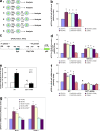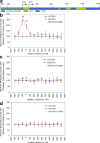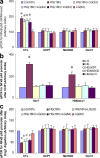Transient high glucose causes persistent epigenetic changes and altered gene expression during subsequent normoglycemia
- PMID: 18809715
- PMCID: PMC2556800
- DOI: 10.1084/jem.20081188
Transient high glucose causes persistent epigenetic changes and altered gene expression during subsequent normoglycemia
Erratum in
- J Exp Med. 2008 Oct 27;205(11):2683
Abstract
The current goal of diabetes therapy is to reduce time-averaged mean levels of glycemia, measured as HbA1c, to prevent diabetic complications. However, HbA1c only explains <25% of the variation in risk of developing complications. Because HbA1c does not correlate with glycemic variability when adjusted for mean blood glucose, we hypothesized that transient spikes of hyperglycemia may be an HbA1c-independent risk factor for diabetic complications. We show that transient hyperglycemia induces long-lasting activating epigenetic changes in the promoter of the nuclear factor kappaB (NF-kappaB) subunit p65 in aortic endothelial cells both in vitro and in nondiabetic mice, which cause increased p65 gene expression. Both the epigenetic changes and the gene expression changes persist for at least 6 d of subsequent normal glycemia, as do NF-kappaB-induced increases in monocyte chemoattractant protein 1 and vascular cell adhesion molecule 1 expression. Hyperglycemia-induced epigenetic changes and increased p65 expression are prevented by reducing mitochondrial superoxide production or superoxide-induced alpha-oxoaldehydes. These results highlight the dramatic and long-lasting effects that short-term hyperglycemic spikes can have on vascular cells and suggest that transient spikes of hyperglycemia may be an HbA1c-independent risk factor for diabetic complications.
Figures




References
-
- Brownlee, M., L.P. Aiello, M.E. Cooper, A.I. Vinik, R. Nesto, and A.J.M. Bolton. 2008. Diabetic Complications. In Williams Textbook of Endocrinology, 11th ed. Larsen, P.R., Kronenberg, H., Melmed, S., and Polonsky, K., editors. W.B. Saunders, Philadelphia. 1417–1501.
-
- Al-Kateb, H., A.P. Boright, L. Mirea, X. Xie, R. Sutradhar, A. Mowjoodi, B. Bharaj, M. Liu, J.M. Bucksa, V.L. Arends, et al. 2008. Multiple superoxide dismutase 1/splicing factor serine alanine 15 variants are associated with the development and progression of diabetic nephropathy: the Diabetes Control and Complications Trial/Epidemiology of Diabetes Interventions and Complications Genetics study. Diabetes. 57:218–228. - PMC - PubMed
-
- Hu, F.B., M.J. Stampfer, C.G. Solomon, S. Liu, W.C. Willett, F.E. Speizer, D.M. Nathan, and J.E. Manson. 2001. The impact of diabetes mellitus on mortality from all causes and coronary heart disease in women: 20 years of follow-up. Arch. Intern. Med. 161:1717–1723. - PubMed
-
- Fox, C.S., S. Coady, P.D. Sorlie, D. Levy. B. Meigs, R.B. D'Agostino Sr., P.W. Wilson, and P.J. Savage. 2004. Trends in cardiovascular complications of diabetes. JAMA. 292:2495–2499. - PubMed
-
- Krolewski, A.S., E.J. Kosinski, J.H. Warram, O.S. Leland, E.J. Busick, A.C. Asmal, L.I. Rand, A.R. Christlieb, R.F. Bradley, and C.R. Kahn. 1987. Magnitude and determinants of coronary artery disease in juvenile-onset, insulin-dependent diabetes mellitus. Am. J. Cardiol. 59:750–755. - PubMed
Publication types
MeSH terms
Substances
Grants and funding
LinkOut - more resources
Full Text Sources
Other Literature Sources
Medical
Molecular Biology Databases
Research Materials

